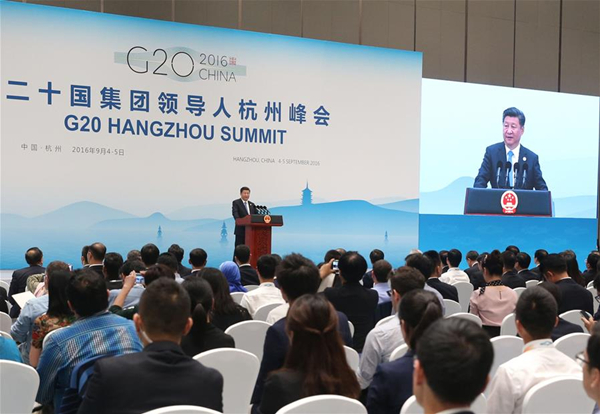G20 summit concludes with historic consensus on world growth
 0 Comment(s)
0 Comment(s) Print
Print E-mail Xinhua, September 6, 2016
E-mail Xinhua, September 6, 2016
 |
|
Chinese President Xi Jinping attends a press conference after the 11th summit of the Group of 20 (G20) major economies in Hangzhou, capital of east China's Zhejiang Province, Sept. 5, 2016. [Photo/Xinhua] |
The 11th summit of the Group of 20 (G20) major economies concluded in Hangzhou on Monday, reaching extensive consensus on pursuing innovative, invigorated, interconnected and inclusive world economic growth.
"Held at a critical time for world economic growth and the transformation of the G20, the Hangzhou summit attracted wide attention from the whole world and carried high expectations," Chinese President Xi Jinping said at a press conference after the summit's conclusion.
From Sunday to Monday, leaders of G20 members, guest countries and international organizations exchanged views on topics including more effective global economic and financial governance, robust international trade and investment, and inclusive and interconnected development.
They also discussed prominent issues affecting the global economy, including climate change, refugee, anti-terrorism, financing and public health.
CHARTING A NEW COURSE
World economic recovery remains weak this year. The World Bank in June cut its 2016 global growth forecast to 2.4 percent from 2.9 percent projected in January, partly due to sluggish growth in advanced economies, stubbornly low commodity prices and weak global trade.
The forecast is much lower than a year-on-year growth of 6.7 percent in the first half of 2016 in China, in line with the government's target to keep its annual growth between 6.5 percent and 7 percent this year.
The world has been hoping for Chinese wisdom and prescription to cope with common challenges after the country took over the G20 presidency.
Xi said in a closing speech that leaders attending the summit decided to point out the way and set the course for the world economy.
"We will continue to reinforce macro-policy dialogue and coordination, work in the spirit of partnership to promote mutual help and win-win cooperation, and focus our minds and energy to pursue strong, sustainable, balanced and inclusive growth," Xi said.
A G20 Leaders' Communique of the Hangzhou Summit was adopted to set out the direction, targets and steps of G20 cooperation and depict the blueprint for future world economy.
A mix of effective tools, including fiscal, monetary and structural ones, must be implemented to buffer against short-term risks and unleash medium- to long-term potential, Xi said.
"This will send a strong signal of G20's commitment to promoting global growth, and help shore up market confidence and ensure stability of global financial markets," Xi said.
BLUEPRINT ON INNOVATIVE GROWTH
"We are determined to break a new path for growth to inject new dynamism into the world economy," Xi said.
Past realities teach us that merely relying on fiscal and monetary policies does not work for the world economy, Xi said, adding that the world should pursue innovation-driven economy and create a new round of growth and prosperity.
The leaders unanimously adopted the G20 Blueprint on Innovative Growth, which reflects their desire to find the right path toward sustainable and healthy growth.
The G20 members will capitalize on the new opportunities brought about by innovation, new industrial revolution, digital economy and other new factors and business types, and make a series of action plans, he said.
They are also going to encourage innovation in various domains and ensure that the fruits of innovation are shared, Xi said.
"The blueprint provides us with the consensus, action plan and the overall framework to open up a new path for global growth and increase medium- to long-term potential of the world economy," he said.
BETTER GOVERNANCE, INCLUSIVE GROWTH
The leaders were also determined to improve global economic and financial governance to enhance the resilience of the world economy, and to revitalize international trade and investment as the key engines of growth and build an open world economy, Xi said.
They agreed to advance the quota and governance reform of international financial institutions, broaden the use of Special Drawing Rights, strengthen the global financial safety net and make the international monetary system more stable and resilient.
The leaders agreed to deepen cooperation on financial inclusion, green finance and climate funds, and formulated an action plan on energy access, renewable energy and energy efficiency, Xi said.
They will also enhance international tax cooperation, and join efforts of anti-corruption to deprive all corrupt persons of any safe haven in G20 countries and beyond, he said.
G20 members reiterated their stance to oppose trade protectionism and support multilateral trading mechanisms in pursuit of trade growth, and formulated guiding principles for investment policymaking to facilitate investment around the world.
Consensus was also made to promote inclusive and interconnected development, so that G20 cooperation will deliver benefits to the whole world, according to Xi.
For the first time, the summit put development at the center of global macro policy framework and made a groundbreaking action plan implementing the 2030 Agenda for Sustainable Development, he added.
"The development of G20 has a bearing on the immediate interests of all its members and the future of world economy. Only when the mechanism responds to changes and advances with the times can it retain its vitality," Xi said.






Go to Forum >>0 Comment(s)